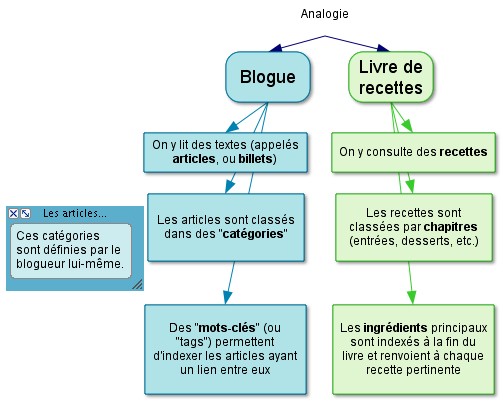Le blogue est un outil idéal pour faire entrer une classe dans l’ère 2.0. Facile à créer et à utiliser, ce journal virtuel permet de garder de précieuses traces des progrès de l’année et de partager réflexions et apprentissages tout en pratiquant l’écriture.
De nombreuses classes d’ici et d’ailleurs ont déjà adopté le blogue comme outil de travail en classe. Il encourage les élèves de la génération numérique à lire et à écrire, et ce peu importe la matière concernée. C’est une façon de travailler avec laquelle ils deviennent vite confortables. De plus, le blogue introduit dès le plus jeune âge la notion de citoyenneté numérique, avec tous les devoirs et responsabilités qui viennent avec. Une enseignante américaine en parle ici.
Comment créer son blogue?
Deux plateformes demeurent très populaires et sont faciles à utiliser : Blogger (s’intègre facilement à votre compte Google si vous en avez un) et WordPress.
Différentes façons de concevoir le blogue en éducation
Une façon d’aborder le blogue comme outil d’apprentissage est de faire en sorte que chaque élève ait son espace de publication personnel. Son blogue sera en quelque sorte son portfolio électronique. L’enseignant peut guider les élèves en leur indiquant quels types de travaux y publier. L’Institut St-Joseph, à Québec, utilise les blogues avec les élèves depuis plusieurs années. Pour en avoir un aperçu, rendez-vous sur le blogue de la classe Démocra-TIC et voyez dans la colonne de droit la liste des blogues d’élèves!
Lors de mon passage au secondaire, je me souviens qu’il fallait tenir un journal de ce que nous apprenions dans chacune des périodes de cours. Ce « cahier de synthèse » devait nous permettre de garder des traces de nos apprentissages. À la fin de l’année, il était pourtant le premier envoyé au recyclage! J’imagine maintenant que ce même travail ait été réalisé sur un blogue, en utilisant les catégories pour regrouper les réflexions par domaines, puis les mots-clés (ou « tags ») pour rassembler les sujets… Avec la possibilité de laisser des commentaires aux autres pour engager la discussion, de faire des hyperliens pour compléter l’information, d’ajouter des images pour aller chercher l’aspect visuel… Il me semble que la portée aurait été toute autre!
Il y a d’autres types de blogues liés au monde scolaire. Par exemple, certains enseignants vont s’en servir comme un moyen de communication avec les élèves de leur classe (et par conséquent, une source d’information pour les parents). C’est le cas notamment de celui de Martin Bélanger, enseignant en 3e secondaire, ou des 5e année de l’école Entramis à Repentigny.
D’autres enseignants choisissent aussi de tenir un blogue professionnel, dans lequel ils expriment leur vision de l’éducation, réfléchissent à des enjeux, partagent des trouvailles, etc. C’est le cas, par exemple, du Professeur masqué, ou encore d’Éric Noël du Séminaire de Chicoutimi.
À votre tour!
Nous avons eu l’occasion de présenter quelques projets de classe intégrant les blogues au fil des années. Est-ce que ce sera votre tour cette année? N’hésitez pas à nous parler de votre expérience!
En rappel :
– Plaisir d’écrire avec le blogue en classe (Nancy Dubois, CS des Affluents)
– Le blogue pour motiver les élèves à écrire (Étude de l’Université du Québec à Chicoutimi)
En un coup d’oeil :





 Recevez l'Info #DevProf et l'Hebdo pour ne rien manquer des nouveautés de l'École branchée!
Recevez l'Info #DevProf et l'Hebdo pour ne rien manquer des nouveautés de l'École branchée!




